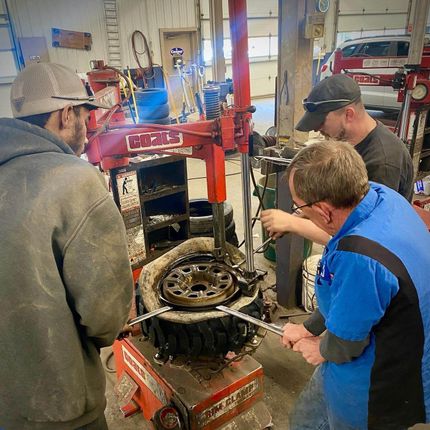Boost Your Drive: Top-Notch GMC Tires Service at Morris Tires
Boost Your Drive: Top-Notch GMC Tires Service at Morris Tires
Blog Article
Tire Service: The Effect of Climate Condition
When it comes to ensuring optimal efficiency and safety on the roadway, comprehending the effect of weather conditions on tire service is crucial. GMC Tire Service. In this conversation, we will check out the complex connection between climate conditions and tire service, losing light on the value of weather-specific tire upkeep practices and factors to consider.
Warm and Tire Efficiency
When exposed to high temperatures, tires experience modifications in performance that can substantially affect lorry safety and security and handling. The warmth produced from long term driving or warm climate problems causes the tire rubber to soften, leading to minimized tread life and increased wear.

Cold Weather Condition Impacts
Cold weather problems can have a substantial effect on tire performance and safety and security. As temperatures drop, tire rubber can solidify, causing reduced grip on icy or snow-covered roads. In cold climate, tires might also lose air pressure extra quickly, which can affect handling and gas performance. Additionally, cool temperatures can cause tire sidewalls to stiffen, raising the danger of damages from splits or various other roadway dangers.
To mitigate the results of cold weather condition on tires, it is essential to routinely check tire pressure and inflate them to the supplier's recommended degrees. Making use of wintertime or all-season tires made for cool weather conditions can likewise boost grip and grip on icy or snowy roadways. Correct tire maintenance, consisting of routine evaluations for wear and damages, becomes even extra important throughout colder months to make certain optimum performance and safety.
Rainy Issues Influence
Tires with worn-out treads are more prone to hydroplaning, where a layer of water develops up between the tire and the road surface, leading to loss of grip. To combat this, vehicle drivers should consistently examine their tires for sufficient walk depth and think about investing in tires particularly created for wet conditions.
Moreover, rainy weather can additionally decrease exposure, making it challenging for motorists to see the road in advance clearly (GMC Tire Service). In such conditions, it is important to adjust driving speeds as necessary and maintain a secure adhering to distance to enable unexpected stops. Properly inflated tires can also assist in keeping control on wet roads by giving much better handling and grasp
Snow and Tire Security
Snow-covered roadways position distinct obstacles for vehicle drivers, emphasizing the importance of correct tire selection and upkeep. When driving in snowy problems, having the ideal tires can make a considerable difference in safety and security and efficiency. Winter months tires are made with special rubber compounds and walk patterns to offer far better grip on snow and ice contrasted to all-season tires. The deeper treads and sipes of winter season tires assist grip the roadway much better, decreasing the risk of gliding and slipping.

It is important to comply with producer directions when setting up and utilizing tire chains to avoid damages to the tires and vehicle. By selecting the right tires, keeping correct rising cost of living, and thinking about additional traction aids like tire chains, drivers can improve their safety and security when navigating snow-covered roads.
Weather-Related Tire Upkeep
Weather-related tire upkeep incorporates an array of practices aimed at ensuring optimum tire feature and durability in different weather circumstances. One essential aspect of weather-related tire maintenance is tire stress guideline. Inspecting tire step on a regular basis and replacing tires when walk wear reaches a specific deepness is essential for preserving grip and stability in negative weather.
Verdict
In verdict, weather conditions have a substantial impact on tire performance and safety. From warm impacting tire stress and wear to chilly weather decreasing traction, it is vital to think about the climate when preserving and utilizing tires.
In this discussion, we will certainly check out the intricate relationship in between climate problems and tire solution, losing light on the significance of weather-specific see this page tire upkeep practices and factors to consider.

Report this page